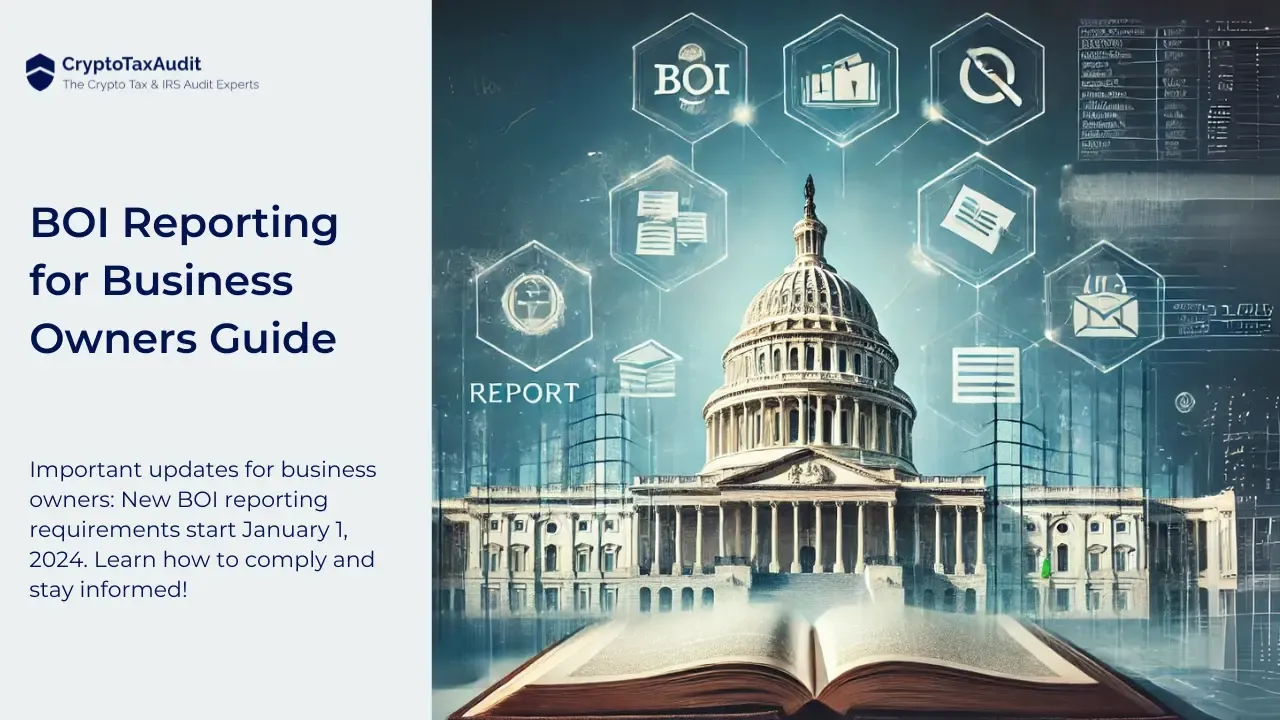
Is the IRS joining the SEC in its apparent conspiracy against crypto? Why isn't the government trying to clarify the law rather than using it as a weapon against crypto companies? (TCDS-07)
Is there a government conspiracy against crypto?
Let's discuss what appears to be the government’s Operation Choke Point 2.0. And, let's see how the IRS may get involved.
Biden's executive order?
You know what's been going on with President Biden's Executive Order on regulating cryptocurrencies? A whole lot of nothing, that's what.
Yellen's promise?
Six months ago, Treasury Secretary Janet Yellen promised recommendations on regulating crypto, but we still haven't seen anything.
What have we seen? Simply, we have seen enforcement, sometimes called "regulation by enforcement". The enforcement has been led by the SEC Chairman Gary Gensler. He's going after crypto exchanges left and right, all under the guise of enforcing securities law on cryptocurrencies.
And the Fed?
And let's not forget about the Federal Reserve closing down crypto-friendly banks. It's starting to look like Operation Choke Point 2.0, folks.
What was OCP 1.0?
Just for reference, the original Operation Choke Point 1.0 was launched under President Obama, where the Justice Department started investigated banks that dealt with firearms dealers, payday lenders, and other companies believes to be at risk for money laundering. In fact, these measures appeared to be quite political in nature, a "weaponization" of a government agency against legal businesses that were not politically palatable to those in charge.
Well, this time, the target is crypto and those that would support the industry's growth. They are being seen as a threat to the powers that be.
Will cryptos be treated as securities?
But wait, it gets worse. What if the IRS decides to treat cryptocurrencies as securities under tax law?
What if the IRS decides to treat cryptocurrencies as securities under tax law?
That's right, I said it. The IRS hasn't done it yet, but they could. And if they did, it would be a disaster for crypto investors.
Defining security.
The term security may not be defined in income tax law, but it's frequently used. It closely aligns with the definition of stocks and stock rights. Stocks give you ownership of a corporation and a say in how it's run. If the IRS treated crypto as securities, it would mean more taxes and more regulations for crypto investors.
Killing off cryptos?
So, is this all part of a larger plan to kill off crypto investing in America? I don't know, but it's starting to look like it. Instead of getting the promised regulations, we're getting "choke point."
The SEC is leading the charge on this "regulation by enforcement" campaign, and now the IRS could be next. This is a dangerous game they're playing.
It's time to stand up for our crypto rights before it's too late.
It's time to stand up for our crypto rights before it's too late. Just look at Canada's recent restriction on the purchase of cryptos. It's probably coming to the US too.
Regulating cryptos.
The government has been trying to figure out how to regulate cryptocurrencies for a while now. While we haven't seen any concrete regulations yet, the IRS might be looking to make a move soon. All they need to do is announce that they will treat crypto investing the same as stock investing, where stocks represent ownership in a corporation.
Are cryptos corporations?
Now, you might be thinking, how can cryptocurrencies even be considered corporations? Well, the organizational structure of a blockchain is called a DAO, a Distributed Autonomous Organization. While DAOs are unincorporated, they do operate like a corporation in important ways. Ownership of tokens grant some say over governance and rewards.
DAOs are associations.
In tax law, a DAO is considered an association. An association is a group of persons working together for a common purpose. According to section 7701 of the Tax Code, associations are considered corporations and are taxed like corporations under current tax law.
If cryptos are considered corporations, then crypto investing could be taxed like stocks.
If cryptos are considered corporations, then crypto investing could be taxed like stocks. If the IRS asserts this argument, it would be consistent with the SEC and existing tax law. Let’s tease out some implications.
What if cryptos are taxed like stocks?
Let’s look at wash sales, PFICs, and foreign asset reporting, and their implication on cryptos. That is, what if cryptos were taxed like stocks are today?
Wash sales.
If crypto investing is taxed like stocks, the wash sale rule in section 1091 would apply.
And what's the wash sale rule, you might ask? Well, if you sell a certain crypto for a loss and buy it back within thirty days before or after the sale, you can't claim the loss on your tax return.
Here’s the problem. This would devastate high-frequency traders who are constantly in and out of the same crypto. To avoid the wash sale rule, they need to get Active Trader Status, which is tough to qualify for and sustain.
PFICs.
Now, let's talk about the PFIC rule. PFICs are Passive Foreign Investment Corporations. Since DAOs would be considered corporations under tax law, and since there aren't any DAOs incorporated under US law, then DAOs would be considered foreign corporations.
If 75% or more of the DAO’s income is from passive sources or 50% of the assets generate passive income, it would be considered a passive foreign investment corporation or PFIC. Since all DAO income is passive, all DAOs would qualify as PFICs, including Bitcoin.
High PFIC taxes.
Now, here's where it gets tricky. The PFIC tax is brutal, folks. It can take 40% to 60% of your investment profits. If you live in a state with a high-income tax rate, like California, the combined tax could exceed 70%.
Why is the tax so high? Congress created the PFIC laws to punish taxpayers who invested in foreign mutual funds. They wanted to encouraged Americans to keep investing in US-based mutual funds. And it worked.
The PFIC tax rules are complicated to calculate and require special software. If the IRS applied the 40% to 60% PFIC tax to crypto investing, it would be crushing. Investors might stop trading cryptos or even stop reporting their crypto income on their tax returns, which would be considered tax fraud.
The only way to avoid the PFIC tax is to show that not all the owners of a particular DAO have limited liability. If it can be shown, it would prevent the DAO from being treated as a corporation.
But here's the thing, folks. Could the IRS be playing an upcoming role in Operation Choke Point 2.0? It's worth considering.
Foreign assets.
If cryptos are taxed like stocks, we will have to start reporting foreign assets. That's where things get even more complicated.
Under the FATCA law, the Foreign Account Tax Compliance Act, described in tax code section 6038D(b)(2)(A), you're required to report "any stock or security issued by a person other than a United States person." Virtually all DAOs would be considered non-US persons. (Note that "persons" also refer to corporations in tax law.)
FATCA is a law passed back in 2010, and it’s no joke. Taxpayers must report certain foreign financial assets on Form 8938 if the value is over a threshold of $50,000 per person.
Non-reporting penalties.
Now, don't get me wrong, there's no tax associated with Form 8938. But if you fail to file it when you should have, you're in for a world of hurt. You could face a $10,000 penalty just for not filing it with your original return.
And that's not all. The statute of limitations on your tax return is suspended until you file Form 8938. That means there's no time limit for the IRS to come after you.
The statute of limitations on your tax return is suspended until you file Form 8938.
Plus, any additional tax related to assets that should have been reported on Form 8938 is subject to a higher 40% accuracy penalty. That's right, a 40% penalty.
Suspending the statute of limitations.
The greatest risk for early crypto investors is having the statute of limitations suspended. But don't worry, there is a solution. You can amend your past returns to add Form 8938 using the IRS Delinquent International Information Return procedure for voluntary disclosure.
However, very few crypto tax preparers know about Form 8938 or the procedure. And for many, the form isn't even supported in their tax software. This makes the unwary crypto investor very vulnerable.
Will the IRS follow the SEC's lead?
So what's the deal with the IRS? Will they follow the SEC's lead? Will they have a role in Operation Choke Point 2.0? The truth is that the laws are already in place for the IRS to treat cryptos as stocks.
The truth is that the laws are already in place for the IRS to treat cryptos as stocks.
All they need to do is issue a public notice and give an obligatory three months for public comment. And get this: enforcement could even be retroactive. That's a massive risk for investors.
If the IRS decides to treat crypto investing the same as they do for securities, the consequences would be devastating.
Other countries could follow.
We just looked at three issues: wash sales, PFIC treatment, and foreign asset reporting. There are other consequences that I haven't explored in this article, such as the taxation of futures, options, straddles, and derivatives. And here's the kicker, other countries could follow the US lead in taxing cryptos as securities.
So, to sum it up, we're in some unusual times. If you're not careful, you could be in for a world of hurt when it comes to taxes and cryptos.
Forewarned is forearmed.
The old adage of "forewarned is forearmed" is relevant here. Knowing what might be on the horizon gives you time to think about strategies to avoid or minimize your exposure to potential changes in tax law in the United States, and possibly in other countries as well.
No matter how bad things get, though, remember: taxes are sexy.
DISCLAIMER: Opinions and perspectives of the author, host, and guests. It should not be construed as U.S. taxpayer advice. There are often multiple interpretations of tax law. Various strategies may be suited to specific individuals and for particular situations. Seek out professional tax, legal, or financial advice from CryptoTaxAudit or from other reputable companies.




